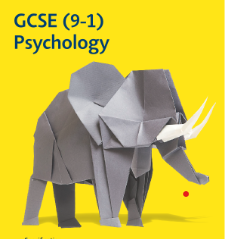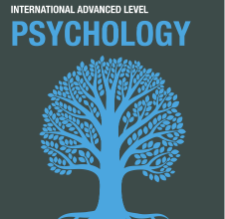November 2024 Psychology subject update
Welcome to your Pearson Edexcel Psychology November 2024 subject update.
Hello colleagues,
Our specification for International A Level Psychology has recently been updated with a small number of fairly minor amendments which will affect exams from January 2026 onwards, and this update contains some explanation of the implications for teachers. There are no changes to the specification for the UK A Level or for GCSE psychology for first teaching in September 2025. For IAL teachers there are also links here to key documents including new full-mark exemplars for Unit 3 synoptic questions, and news of updates to a variety of free support materials.
This update also contains some FAQs for GCSE psychology teachers, news of opportunities to work with us, and free resources 'coming soon' to support UK A Level teachers.
Best wishes,
Tim Lawrence
Psychology Subject Advisor
If you have any questions, then please do contact me:
☎ Call: 0344 463 2535
✉ Email: teachingpsychology@pearson.com
💻 Book a Teams meeting with me: https://bit.ly/4bBZjpB
This update includes:
- Opportunities for teachers with examiner experience: find out about our 'Credible Specialist' roles which can be fulfilled alongside full-time teaching.
- Assessment Associate (examiner) recruitment: more information coming soon.
- AS and A Level: news of new exemplar responses with commentaries and teaching resources - both coming soon.
- GCSE: FAQs with answers from senior examiners.
- International A Level: an explanation of some minor changes to the specification for exams for January 2026 onwards.
We are seeking to recruit Credible Specialists for GCSE and A Level psychology. This role is open to experienced teachers of our GCSE and A Level psychology courses, and can be fulfilled alongside a full-time teaching role. For full details see the link below, but in short this role mainly involves contributing to the development of resources to support teachers, and delivering training events using slide decks and supporting notes written by senior examiners. Typically this will involve a few hours work per month, at the most, and if specialists don’t have the capacity to take on a particular piece of work there’s no issue with them ‘passing’.
The title on the page below reflects the fact that we are also recruiting for Credible Specialists for biology - it does not mean that you need experience of both subjects.
We will shortly be opening our recruitment process for new examiners, or Assessment Associates as they are formaly known, for GCSE, A Level and International A Level psychology. I will share details in another update soon.
There will be opportunities for teachers at all stages in their careers, and full training provided. In addition to the pay, teachers can gain a great deal of understanding of the demands of exam questions through this work and many find it extremely useful in informing their teaching.
In response to teacher feedback we have commissioned our senior examiners to produce a new set of exemplar responses to extended response (essay) questions and short-answer questions, with commentary explaining how the answers have gained marks.
These can be downloaded from the 'teaching and learning materials' page and require an Edexcel Online Login as the responses are to questions asked in the most recent set of exams. The link below will take you to the exemplar material section of the page.
Teachers of Edexcel A Level economics have been making good use of a new collaboration with the Financial Times, and as many of their articles have relevance to key topics in A Level psychology we are developing a first set of resources of our own. With input from senior examiners, we are selecting FT articles which relate to specific topics in our specification, and writing accompanying materials to support teachers in using them in the classroom or as independent learning / homework tasks. These will help to address 'key questions' and to support students with the development of their all-important application skills.
The first batch of new free resources will be published on our qualification website shortly, under 'teaching and learning materials', and I will share a link to them in a future update.
Frequently Asked Questions
A number of teachers asked very good questions during our Exam Insights training in October, and we have collected them here along with answers informed by consultation with senior examiners.
9 mark ‘essay’ questions always have the ‘assess’ command word, and the breakdown of marks is always 3 marks for AO1 (knowledge and understanding of the topic not related to the scenario), 3 marks for AO2 (application to the scenario) and 3 marks for AO3 (analysis and evaluation). The 12 mark question in the research methods section of Paper 2 will always have the ‘evaluate’ command word, with 4 marks for AO1 (knowledge and understanding of the method not related to the scenario), 4 marks for AO2 (application to the scenario) and 4 marks for AO3 (analysis and evaluation).
The 'two areas' need to be two different topics that candidates have studied on the qualification. For example, social influence (topic 5) and development (topic 1) would be adequate. However, conformity (part of topic 5, social influence) and obedience (also part of topic 5, social influence) would only be considered one area.
For the 9 mark essays, the descriptors in the levels based mark scheme are used to give a mark for the response. Although the mark scheme also gives one bullet point of ‘indicative content’ per mark for each AO, these are simply examples of points which could be made, and examiners to not ‘count points’ when deciding the mark to award. A separate judgement is made for each AO and then an overall judgement is made based upon the relative strength of each AO.
Conclusions and judgements would be part of the consideration for the AO3 element of an essay. Responses don’t need a final ‘concluding paragraph’, but AO3 (even at Level 1) should involve some ‘mini-conclusions’ or judgements. If there were no AO3 creditworthy at all, but the AO1 and AO2 were judged as Level 3, then the overall judgement would likely be Level 2, depending on the strength of the AO1 and AO2 material. A mark of 5/9 would definitely be possible with very strong AO1 and AO2.
Questions asking for a conclusion (for example, 1PS0/01 2024 Q5a), using data as it is given, that is relevant and appropriate to that conclusion, would be sufficient. Some candidates do prefer to 'process' the data, for example by calculating the percentage change in mean score, but this is not necessary - just an equally acceptable way of gaining credit.
‘Use a larger sample’ is a common response when a question asks for a suggested improvement to a study, and sometime this is relevant. Often though the sample used is not particularly small, and it is therefore not the case that using a larger one would improve the reliability or generalisability of the findings. In many types of study psychologists use 20 participants or fewer, and judge that this is a sufficient size to produce a replicable and valid set of results. In many cases, a sample is more likely to be improved by using a different sampling method to make the sample more representative of the target population. For example using a random sample will generally produce more generalisable findings than a volunteer sample.
No – in general the content shown in mark schemes is ‘indicative’ - that it, it is an example of one way to gain credit. Many studies and other concepts are included in mark schemes which students do not need to be taught, as long as they have covered something else that would be relevant to answer the question. The key document to check in terms of what must be covered is the specification. Studies named here must be taught as they a question can directly test students’ knowledge of them. Other studies which may appear in textbooks or in mark schemes are examples of relevant research and alternatives may be covered instead.
Amendment to the Pearson Edexcel International A Level in Psychology Specification
We have recently published a slightly amended specification for IAL Psychology which will come into effect for exams in January 2026 onwards. The intention is to keep change to a minimum while adding clarity, particularly around the synoptic element of one question in Unit 3. See below for an explanation of the changes with guidance on what they mean for teachers.
In addition to the new version of the specification, you can still access the previous version on the qualification website and via the link below so you can refer to this for exams in 2025. A new resource has also been added to the ‘teaching and learning materials’ section of the website, with two exemplar candidate responses to the synoptic 8 mark question on developmental psychology with examiner commentaries, which you can also download using the link below.
What’s changed?
In Topic D: Learning theories and development in Unit 2 the section on Freud was previously:
Freud’s psychosexual stages of development - 4.1.4 Freud’s psychosexual stages (oral, anal, phallic, latent and genital) and the role of the unconscious in the development of personality.
This is changing to:
Psychodynamic approach to personality development - 4.1.4 The psychodynamic approach to personality development, including either Freud's theory of personality development or the object relations school of thought.
What this means for teachers
If you are happy teaching Freud’s psychosexual stages of development you do not need to make any changes to how you teach this specification point. However, if there are issues in your school with the teaching of this content you will now have the option of covering the more contemporary object relations school of thought, a psychodynamic approach with less focus on unconscious sexual drives.
Questions on this specification point in papers from January 2026 onwards will give candidates the option of answering using their knowledge of Freud or the object relations school of thought. An example is given in the new Sample Assessment Materials (sample papers):
Q5 (a) In the psychodynamic approach to personality development, you will have learned about one of the following:
• Freud’s theory of personality development.
• The object relations school of thought.
Describe the main features involved in either
• Freud’s theory of personality development or
• The object relations school of thought. (3)
What’s changed?
In the ‘assessment overview’ for Topic E, Developmental psychology in Unit 3, “one eight-mark synoptic question is based on developmental psychology and issues from units 1 and 2” is changing to “one eight-mark synoptic question is based on issues and debates in developmental psychology. Learners may draw on content (concepts and theories), studies and/or research methods from across all topic areas.”
In the content section for Topic E, Developmental psychology, specification point 5.4 was previously as follows:
5.4 Issues
5.4.1 The extent to which psychological research in developmental psychology is scientific, drawing on material from units 1 and 2.
5.4.2 The strength and weaknesses of psychological research in developmental psychology, drawing on material from units 1 and 2.
5.4.3 Ethical issues in psychological research as an issue in developmental psychology and drawing on material from units 1 and 2.
It is changing to this:
5.4 Issues and debates
5.4.1 Ethical issues in research (animal and human).
5.4.2 Practical issues in the design and implementation of research.
5.4.3 Reductionism versus holism when researching human behaviour.
5.4.4 Ways of explaining behaviour using different approaches, models or theories.
5.4.5 The issue of psychology as a science.
5.4.6 Cultural and gender issues in psychological research.
5.4.7 The role of both nature and nurture in psychology.
5.4.8 An understanding of how psychology has developed over time.
5.4.9 The use of psychology in social control.
5.4.10 The use of psychological knowledge in society.
5.4.11 Issues relating to socially sensitive research.
Learners may draw on content (concepts and theories), studies and/or research methods from across all topic areas.
What this means for teachers
The list of issues and debates is now the same for Unit 3 as it is for Unit 4. This means that to prepare for the second 8 mark question on developmental psychology candidates will need to be familiar with all the issues and debates. However, they will not need to revise theories and studies from Unit 1 and Unit 2 in preparation for their Unit 3 exam. We recognise from teacher feedback that the previous version of the specification was not sufficiently clear on this point, but questions have previously been asked assessing knowledge of specific studies from IAS units.
From January 2026 onwards, the reference in the specification to ‘all topic areas’ and the wider range of issues and debates that can be assessed mean that candidates will have the option to draw on their knowledge of all the topics they have studied but will not be expected to recall specific details of any particular study or theory.
Other minor changes in wording to “all topic areas” in the specification have the same aim – to clarify that while candidates will not be expected to have covered or revised specific content from other topics, they may draw upon any knowledge that is relevant from any topic. For example, it was previously not sufficiently clear whether content from the option topic covered in Unit 3 could be used in responses to synoptic questions in other units – this change clarifies that it can be used as long as it is relevant to the question.
Updates to key support materials
We have been working to update and improve a variety of free resources on our qualification website, fixing broken links and adding new ones, including the Getting Started Guide, Course Planner and Scheme of Work.
The Summary of Studies guide for each unit have also been updated and improved and will appear under the guide section of the page below shortly.
International A Level psychology textbook news
Pearson published textbooks for IAS and IA2 (Year 1 and Year 2) psychology are now available - find out more via the link below.
Subject advisor
Tim Lawrence
Psychology and international Science





